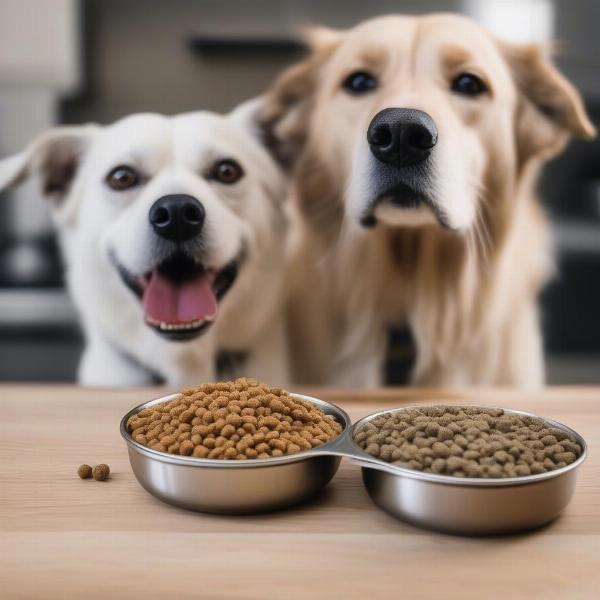Finding the best senior dog food in the UK can feel overwhelming with so many options available. As our canine companions age, their nutritional needs change. Choosing the right food is crucial for maintaining their health, mobility, and overall quality of life. This guide will help you navigate the options and select the perfect senior dog food for your beloved furry friend.
Understanding Your Senior Dog’s Nutritional Needs
Senior dogs, generally those over seven years old, require a different diet than their younger counterparts. Their metabolism slows down, and they may become less active, leading to weight gain. They are also more prone to certain health issues, such as joint problems, dental disease, and cognitive decline. A good senior dog food should address these specific needs. Key nutrients to look for include:
- Glucosamine and Chondroitin: These supplements support joint health and can help alleviate arthritis pain.
- Antioxidants: These protect against cell damage and support the immune system.
- Fiber: This aids digestion and helps maintain a healthy weight.
- High-Quality Protein: This supports muscle mass and overall health, even with reduced activity levels.
- Lower Fat Content: This helps prevent weight gain and reduces strain on internal organs.
“A balanced diet is essential for senior dogs,” says Dr. Emily Carter, a veterinary nutritionist based in London. “Look for foods that are specifically formulated for older dogs, taking into account their age, breed, and any existing health conditions.”
Choosing the Right Senior Dog Food: Dry vs. Wet
Deciding between dry kibble and wet food is a personal choice, often influenced by your dog’s preferences and health conditions.  Different types of senior dog food: dry kibble and wet food Dry food is typically more affordable and convenient, while wet food can be more palatable for picky eaters or dogs with dental issues. Some owners opt for a combination of both.
Different types of senior dog food: dry kibble and wet food Dry food is typically more affordable and convenient, while wet food can be more palatable for picky eaters or dogs with dental issues. Some owners opt for a combination of both.
What is the best type of senior dog food for a dog with dental problems? Wet food is often recommended for dogs with dental issues as it is easier to chew and swallow.
Deciphering Dog Food Labels
Understanding dog food labels can be tricky. Look for the following:
- Ingredient List: The ingredients are listed in descending order by weight. Look for high-quality protein sources, such as chicken, beef, or fish, listed as the first few ingredients. wagg dog food 12kg
- Guaranteed Analysis: This provides the minimum percentages of protein, fat, fiber, and moisture.
- Nutritional Adequacy Statement: This statement indicates that the food meets the nutritional requirements established by the Association of American Feed Control Officials (AAFCO).
- Calorie Content: This is important for managing your senior dog’s weight.
“Don’t be fooled by marketing jargon,” advises Dr. Andrew Davies, a veterinarian with over 20 years of experience. “Focus on the ingredient list and guaranteed analysis to determine the true nutritional value of the food.”
Top Recommended Senior Dog Foods in the UK
While the “best” food depends on individual needs, some highly-rated options in the UK include brands that offer specialized formulas for senior dogs, often focusing on joint support, weight management, and cognitive function. manuka honey and dogs Remember to consult with your vet for personalized recommendations based on your dog’s specific health requirements. grandma mae's dog food
Transitioning to a New Food
When switching to a new senior dog food, do it gradually over a week to avoid digestive upset. Start by mixing a small amount of the new food with the old food and gradually increase the proportion of the new food over several days. evolve dog food grain free
Conclusion
Choosing the best senior dog food in the UK involves understanding your dog’s individual needs, reading labels carefully, and potentially consulting your veterinarian. By prioritizing nutrition, you can help your senior dog enjoy a healthy, active, and fulfilling life. complete dog food uk
FAQ:
- When should I switch my dog to senior food? Generally, around seven years old, but consult your vet for personalized advice.
- Is dry or wet food better for senior dogs? Both have pros and cons; choose based on your dog’s preferences and health needs.
- How can I tell if my senior dog’s food is working? Look for healthy weight maintenance, good coat condition, regular bowel movements, and overall vitality.
- What should I do if my senior dog is a picky eater? Try different flavors and textures, or consider adding warm water or a small amount of wet food to dry kibble.
- Are grain-free diets good for senior dogs? Not necessarily. Consult your vet before switching to a grain-free diet.
- How much should I feed my senior dog? Follow the feeding guidelines on the food label and adjust based on your dog’s weight and activity level.
- Can I give my senior dog human food? Some human foods are safe for dogs in moderation, but always check with your vet first.
ILM Dog is your trusted source for expert advice on all aspects of dog care, from breed selection and health to training and nutrition. We offer a wealth of information to help you provide the best possible care for your furry companion. Contact us today for personalized guidance: Email: [email protected], Phone: +44 20-3965-8624. ILM Dog is dedicated to helping you nurture the bond with your canine companion through every stage of life.